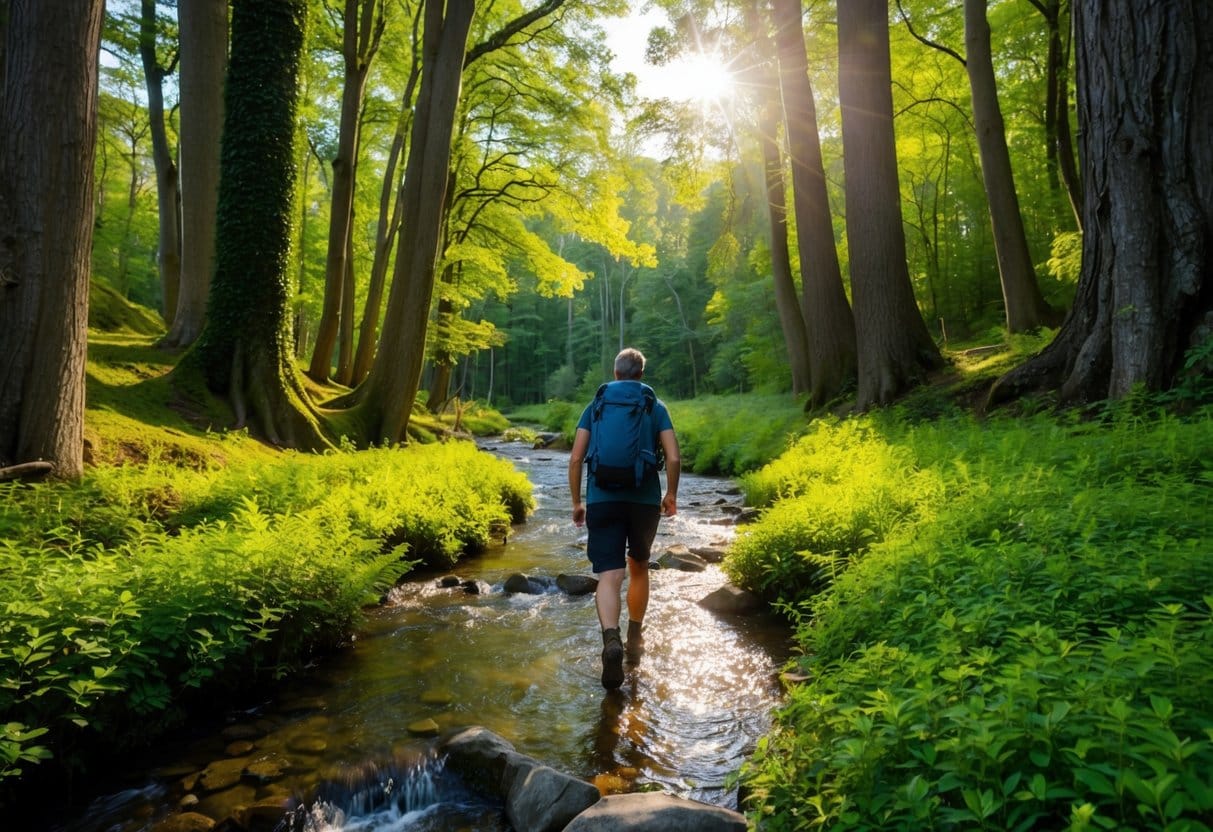Table of Contents
In today’s fast-paced world, the Power of Nature offers a vital pathway to enhancing mental and physical health.
Scientific research consistently highlights how spending time outdoors can lower stress levels, improve mood, and boost overall well-being.
Embracing nature offers a simple yet effective way to alleviate anxiety and depression, leading to a healthier and more balanced life.

By incorporating natural environments into daily life, you can tap into the profound healing power of the great outdoors.
Natural settings provide a unique opportunity for mindfulness and creative enrichment, which can significantly enhance your emotional state.
Activities such as hiking, gardening, or simply walking in the park can lead to noticeable improvements in both mental clarity and physical health.
Every person can benefit from nature’s calming presence, no matter where they live.
Cities are increasingly creating urban green spaces, allowing busy individuals like you to experience the therapeutic impacts without having to travel far. Whether you’re seeking relief from the pressures of modern life or aiming for a healthier lifestyle, reconnecting with the natural world presents a powerful solution.
Key Takeaways
- Nature enhances mental and physical well-being.
- Outdoor activities improve mood and reduce stress.
- Urban green spaces offer accessible nature experiences.
The Science of Nature and Well-Being

Nature offers a wide range of benefits, enhancing mental health, improving cognitive function, and elevating emotional well-being.
Understanding how our connection to nature influences our well-being can guide us in integrating more natural experiences into our daily lives.
Biophilia: Understanding Our Innate Connection to Nature
Biophilia, a term popularized by biologist E.O. Wilson, describes your inherent affinity for nature. It’s suggested that a deep-rooted link exists because of evolutionary processes, as humans have coexisted with nature for millennia.
The biophilia hypothesis posits that you inherently seek connections with living systems. This connection can lead to increased happiness and reduced stress levels.
When you spend time in nature, you’re likely to experience boosts in mood and an improved sense of life satisfaction.
Scientific studies support these claims, showing that engaging with natural environments can enhance your cognitive abilities and emotional well-being.
Activities like gardening, hiking, or even viewing nature scenes can foster a sense of peace and mental clarity.
Psychological Effects of Nature Exposure
Exposure to nature provides substantial psychological benefits.
Interacting with the natural world is effective in lowering stress and anxiety levels. You might notice an uplift in mood and a sense of rejuvenation after spending even a short time outdoors.
Research highlights that being in nature helps improve attention, thus enhancing your cognitive ability. The restorative effects of natural environments encourage relaxation, which aids in reducing symptoms of depression and fatigue.
Emerging evidence also supports the use of nature-based therapies for mental health improvement.
Access to green spaces can support emotional balance and mental clarity, promoting overall mental health and emotional well-being.
Mental Health and Nature Therapy

Engaging with nature offers a multitude of benefits for mental well-being. You’ll find potential relief from stress and ways to tackle anxiety and depression through the practices of nature therapy.
Stress Relief through Green Spaces
Spending time in green spaces, such as parks and gardens, can significantly reduce stress levels.
You might notice a decrease in the production of cortisol, the stress hormone, contributing to a calmer and more tranquil state of mind. Regular exposure to natural settings helps lower blood pressure and heart rate, promoting relaxation.
Engaging with nature allows you to detach from everyday pressures. This detachment aids in emotional health, encouraging better sleep patterns and preparing your mind for daily challenges.
Incorporating short nature walks into your routine can offer gentle relief from stress, leaving you rejuvenated.
Overcoming Anxiety and Depression with Nature
Nature therapy serves as a supportive element for those dealing with anxiety and depression.
It promotes positive changes in mood by encouraging the release of endorphins, enhancing emotional health. Being outdoors encourages a mindful presence that can diminish symptoms of anxiety and improve mental clarity.
Exposure to nature offers a more balanced perspective, reducing feelings of isolation often linked to depression.
Participating in activities like gardening or forest bathing can provide you with a greater sense of purpose and appreciation for life. By immersing yourself in natural settings, you may find notable relief and improved mental resilience.
Physical Health Advantages of Outdoor Activities

Engaging in outdoor activities can significantly enhance your physical health by boosting physical fitness and playing a role in disease prevention. Natural environments offer a unique setting that encourages movement and provides substantial health benefits.
Boosting Physical Activity and Fitness
Outdoor activities, such as hiking, cycling, or walking, actively increase your physical activity levels.
These activities elevate heart rates, promoting cardiovascular health. Elevated heart rate helps improve circulation and strengthens the heart muscle.
Natural settings engage multiple muscle groups, improving strength and endurance. Outdoor exercise can also encourage longer and more enjoyable workouts due to appealing landscapes, reducing workout monotony.
Endorphins released during physical activity enhance mood, providing additional motivation to maintain consistent exercise routines. Increased activity contributes to better weight management, muscle toning, and overall physical fitness.
Nature’s Role in Disease Prevention
Spending time outdoors has protective effects against various diseases.
Regular participation in outdoor activities can help lower blood pressure, reducing the risk of hypertension. Exposure to natural sunlight increases vitamin D levels, aiding in bone health and immune function.
Physical activity in nature reduces the risk of chronic diseases, such as obesity and Type 2 diabetes.
Additionally, outdoor environments encourage diverse exercise routines, which can prevent the onset of joint and muscle ailments.
Natural settings often promote lower stress levels, which are linked to reduced risks of heart disease. Time spent in green spaces has been associated with improved mental health, indirectly supporting better physical health outcomes.
Mindfulness and Creative Enrichment

Engaging with nature can significantly enhance your mental well-being by fostering mindfulness and stimulating creativity. The tranquil environment of natural settings offers a unique space for meditation and creative pursuits, helping you achieve better balance and ground your emotions.
Cultivating Creativity Through Exposure to Nature
Nature provides an inspiring backdrop that can ignite your creative energy.
When you expose yourself to natural surroundings, it can enhance your attention and motivate innovative thoughts. The sights and sounds of the outdoors often serve as a catalyst, encouraging imaginative ideas and new perspectives.
Engaging in creative endeavors while in nature, such as sketching, painting, or writing, allows you to harness these natural stimuli. This connection between creativity and nature fosters a deeper sense of happiness and satisfaction.
To make the most of this, try spending uninterrupted time outdoors with a creative project. This approach can sharpen your focus and cultivate a more profound sense of creativity, aiding you in achieving greater fulfillment and joy in your activities.
Meditative Practices in Natural Settings
Practicing meditation in natural environments offers a unique form of relaxation and grounding.
The calming ambiance of outdoor settings enhances your ability to concentrate on the here and now, facilitating a deeper mindfulness experience.
This setting is particularly beneficial for those looking to reduce stress and improve overall mental clarity.
Natural spaces can naturally enhance the effects of mindfulness by lowering cortisol levels and inviting a more balanced state of mind. Earthing, or the practice of connecting physically with the earth, can further enhance these benefits by promoting a sense of grounding.
To fully embrace this practice, allocate time for meditative sessions in parks, forests, or by bodies of water. Such environments not only foster mindfulness but also enhance happiness and well-being.
The Emotional Impact of Reconnecting with Nature

Connecting with nature has significant effects on your emotional well-being. It can improve mood and emotional stability while boosting your self-esteem through engaging activities.
Enhancing Mood and Emotional Stability
Spending time in natural environments can enhance your mood and emotional stability.
Studies show that being in nature helps reduce stress levels and promotes relaxation. This emotional balance is partly due to the absence of urban stressors and the soothing qualities of natural scenery. Walking through a park or enjoying a forest trail can lower stress hormones, leading to a calmer mindset.
Nature connectedness plays a vital role in maintaining emotional health. By fostering a bond with the environment, you may experience heightened positive emotions and reduced symptoms of anxiety or depression. You may notice that simply observing plants, animals, or water features can ease anxiety, creating a more peaceful state of mind.
Building Self-Esteem with Nature Activities
Engaging in activities within natural settings can significantly boost your self-esteem.
Outdoor involvement, such as hiking, gardening, or nature photography, provides opportunities to achieve personal goals and overcome challenges. These accomplishments contribute positively to your self-worth and sense of capability.
Participating in group activities outdoors can also foster wellbeing. Interacting with others in a natural setting can improve your social bonds, also enhancing self-esteem. As you interact with nature, appreciate its beauty, feel a sense of achievement, and connect with others, your self-confidence can grow, supporting better emotional health.
Outdoor Recreation: From Hiking to Gardening
Engaging in outdoor activities like hiking and gardening offers a multitude of benefits for your mental and physical health. These activities not only boost your mood but also contribute to your overall well-being.
The Varied Health Benefits of Hiking
Hiking is a powerful way to connect with nature, offering both physical exercise and mental rejuvenation.
Walking through scenic trails helps increase your heart rate, promoting cardiovascular health. You also strengthen your muscles and bones, which can improve overall fitness.
While hiking, your exposure to sunlight naturally increases your vitamin D levels, essential for maintaining healthy bones and supporting your immune system. The experience of navigating trails further sharpens your focus and enhances mental clarity. Hearing the birds and rustling leaves provides a soothing backdrop, reducing stress and anxiety levels significantly.
Incorporating hiking into your routine encourages you to spend time outdoors and effectively release daily tensions.
Gardening as a Form of Nature Therapy
Gardening serves as more than a hobby; it is a therapeutic activity that eases stress and fosters tranquility.
This hands-on activity requires attention and care, often leading to increased mindfulness and reduced anxiety levels.
As you tend to your plants, your fine motor skills are put to work, which can improve hand-eye coordination and mental agility. Being rooted in nature by working with soil can enhance your mood and offer a sense of connection with the environment.
Gardening also allows you to cultivate your own green space, filled with plants that can purify air and offer a peaceful sanctuary right at home. The act of gardening can serve as a gentle yet powerful form of therapy, providing solitude and satisfaction.
Connecting With Nature in Urban Environments
Urban environments may seem devoid of natural elements, but there are many ways to reconnect with nature in city settings. By creating more green spaces and incorporating nature into your daily life, you can enhance your mental and physical well-being.
Creating Green Spaces in City Settings
Transforming urban areas to include green spaces is a key strategy for bringing nature to residents.
Parks and community gardens offer opportunities to develop a connection with nature. Public green spaces not only improve the aesthetic appeal of cities but also have practical benefits, like reducing urban heat and promoting outdoor activities.
Rooftop gardens, tree-lined streets, and green walls are innovative solutions. They increase exposure to natural light and provide habitats for various wildlife. By advocating for these initiatives, you contribute to a healthier, more sustainable urban life.
Small-Scale Nature: Balconies, Terrariums, and Houseplants
If creating large green spaces isn’t feasible, consider incorporating small-scale nature into your home. Balconies, terraces, or even windowsills can host plant life, offering a daily nature connection.
Houseplants and terrariums are excellent for nature connectedness. They require minimal space and provide psychological and health benefits, such as air purification and stress reduction.
Outdoor settings aren’t the only way to engage with nature. You can create a sanctuary with plants suited to your environment.
Whether it’s a few potted plants or a lush balcony garden, such spaces foster a calming atmosphere, promoting relaxation and an improved mood.
Frequently Asked Questions
Connecting with nature offers various benefits for both mental and physical health. These include improvements in mood, stress reduction, enhanced cognitive functions, and physical wellness.
How can exposure to natural environments benefit our physical health?
Spending time outdoors can improve physical health by encouraging activities like walking, cycling, or hiking. These activities enhance cardiovascular health and promote better fitness levels.
Natural sunlight provides crucial vitamin D, which is essential for bone health and immune system function. Being in a natural setting also encourages physical movement that can improve muscle strength and flexibility.
What psychological effects does spending time in nature have on an individual?
Nature has a calming effect, reducing stress and anxiety. It can lower cortisol levels, the hormone associated with stress.
Spending time in natural settings can also foster a sense of peace and increase happiness, thereby alleviating symptoms of depression and promoting an overall positive mood. It enhances focus and cognitive clarity, which can improve problem-solving abilities.
What are some ways nature impacts our mental well-being?
Engaging with natural spaces allows for reduced feelings of anger and heightened relaxation. Nature’s sensory experiences, such as the sound of birds or the sight of trees, can evoke pleasant memories and feelings of connectedness.
This connection promotes emotional well-being, encouraging a more positive outlook on life and better emotional regulation.
Can regular outdoor activities improve overall mental health statistics?
Consistent outdoor activities contribute to widespread improvements in mental health. Communities that prioritize parks and green spaces often report lower instances of mental health issues like anxiety and depression.
Exercise in natural environments is linked to an increase in self-esteem and general life satisfaction, indicating a positive trend in mental health statistics.
In what ways does nature’s healing power contribute to psychological and physical recovery?
Nature aids recovery by providing a setting that fosters rejuvenation. Patients recovering from surgery or illness often experience faster healing in environments with natural views.
The serenity of nature reduces stress, allowing for better physical healing. Psychological healing is supported by the peacefulness and restorative qualities nature offers.
How does the environment play a role in enhancing our mental and physical health?
The environment impacts mental and physical health through its ability to influence lifestyle and psychological processes.
Green spaces promote active lifestyles, which contribute to better cardiovascular and muscular health. Environmental exposure can improve concentration, mental clarity, and a sense of well-being, making nature a vital component of a healthy lifestyle.
Ready to harness the power of nature for your health and wellness?
Explore these resources:
- “The Nature Fix: Why Nature Makes Us Happier, Healthier, and More Creative” by Florence Williams: A journalistic deep dive into the science behind nature’s effects on the brain and body. (Highly Recommended)
- “Your Brain on Nature: The Science of Nature’s Influence on Your Health, Happiness and Vitality” by Alan C. Logan and Eva M. Selhub: Explores the neurological and biological benefits of connecting with nature.
- “Forest Bathing: How Trees Can Help You Find Health and Happiness” by Dr. Qing Li: The definitive guide to Shinrin-yoku, the Japanese practice of forest bathing, with practical advice and scientific evidence.
- “The Last Child in the Woods: Saving Our Children From Nature-Deficit Disorder” by Richard Louv: A foundational text on the importance of nature for well-being, especially for children.




